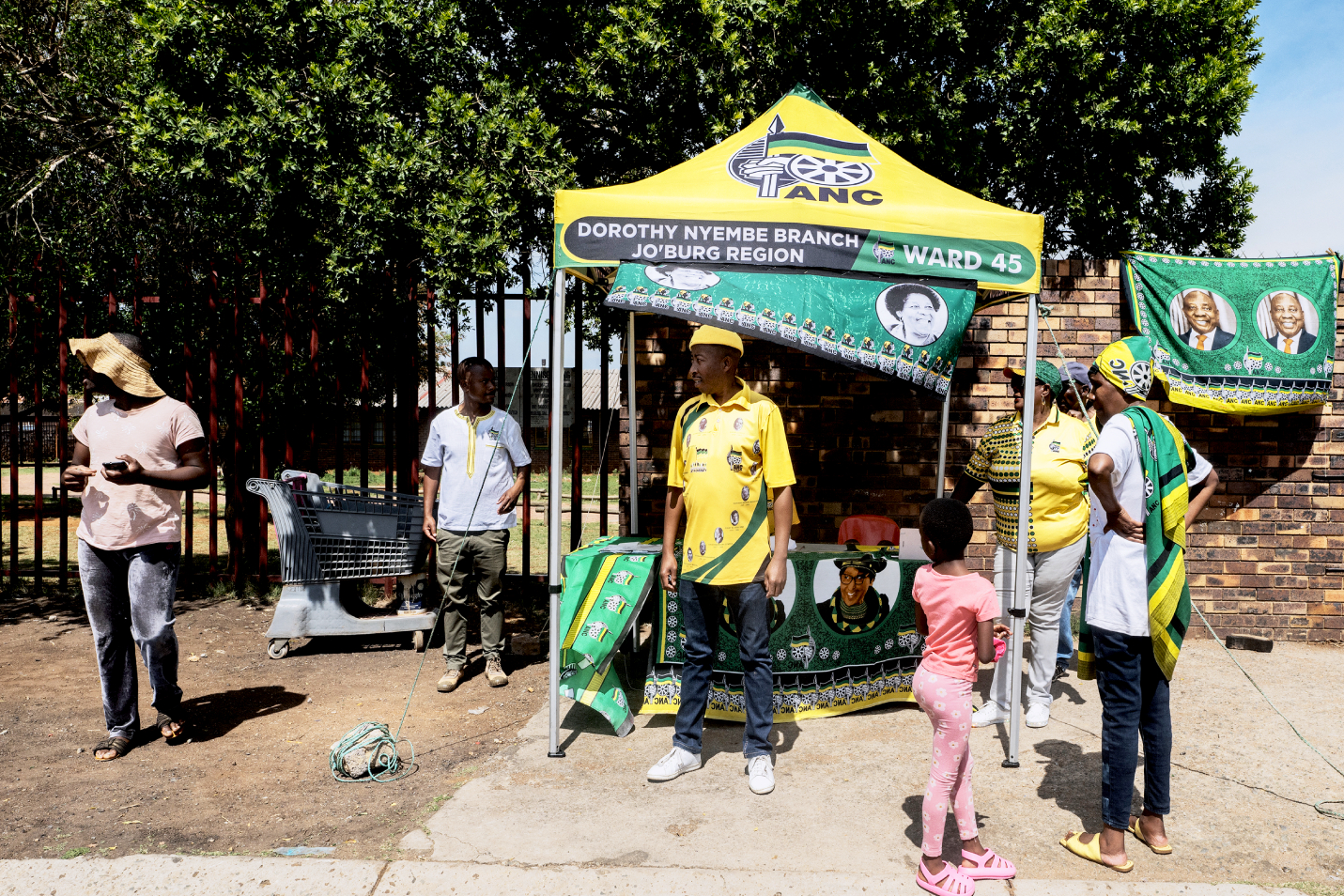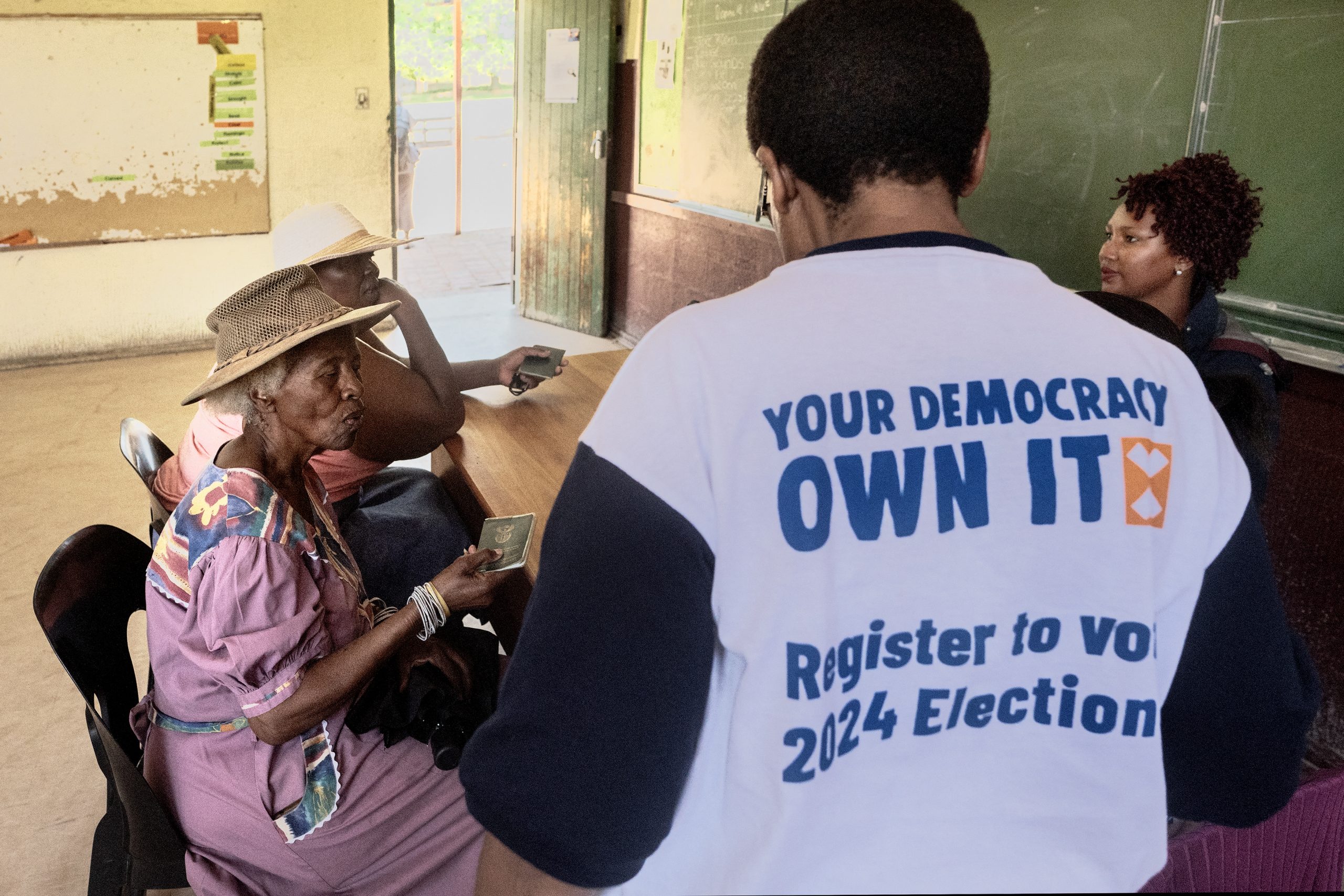South Africa faces its most unpredictable national election of the post-apartheid era in 2024. In every poll since 1994, the African National Congress (ANC) has dominated the vote—earning it an absolute parliamentary majority, from which it could independently select the president and initiate legislation.
That may change during this electoral cycle. Polls suggest that the ANC may receive less than 50 percent of the national vote for the first time ever—mirroring patterns observed in recent municipal and local government elections.
ANC’s declining popularity continues a steady pattern observed since 2007 and is attributed to perceptions of growing systemic corruption within the party, ANC insularity from ordinary South Africans, and poor service delivery embodied by rolling electricity blackouts. South Africa also strains under the burden of growing inequality, poverty, and youth unemployment. Over 60 percent of 15- to 24-year-olds are unemployed, and many in South Africa’s sprawling townships struggle to find enough to eat. The ANC’s long dominance makes it hard to escape responsibility for these popular grievances.
The ANC’s declining popularity is attributed to perceptions of growing corruption, insularity from ordinary South Africans, and poor service delivery.
Opposition parties, meanwhile, have increased their capacity, experience, and leverage in forming coalitions, which has enabled them to steadily reduce the ANC’s parliamentary majorities over time—including in historic ANC strongholds.
Perceptions of impunity, associated with dominant-party political systems, make the ANC—and thus the government—vulnerable to state capture (control over government decision-making by private sector or external actors). This was most famously seen through the influence of the Gupta brothers’ network of private interests within the patronage-laden administration of Jacob Zuma.
Despite the ANC replacing Zuma as head of the party in 2018 with Cyril Ramaphosa—paving the way for him to lead the party into the 2019 elections—the ANC remains riven by internal divisions. While Ramaphosa has slowly increased his support within the party architecture and will again be the party standard-bearer in the 2024 elections, the party is increasingly fragmented. Zuma’s endorsement of a new party, uMkhnoto weSizwe, is a direct challenge to Ramaphosa’s leadership. This follows the formation of another party, the African Congress for Transformation, by former ANC Secretary General Ace Magashule, following his expulsion from the party for misconduct.

Supporters of the African National Congress (ANC) gather in front of a voting station during the nationwide voter registration campaign ahead of the 2024 general elections. (Photo: AFP/Luca Sola)
Even if it gains less than a majority of votes, the ANC still retains more support than any other political party in South Africa. The leading opposition party is the Democratic Alliance (DA), led by John Steenhuisen, which polls show drawing between a quarter and a third of the electorate largely on a good governance and anti-corruption platform. It must, however, overcome the perception of being a white-dominated party. The DA has entered into an alliance called the Multi-Party Charter for South Africa with six mostly small parties.
The ANC also faces a challenge from the Economic Freedom Fighters (EFF) party led by the firebrand former ANC Youth League leader Julius Malema. The EFF has called for populist policies such as state-provided housing, nationalization of mines and other strategic sectors of the economy, and land redistribution. Polls suggest the EFF attracts roughly 10 percent of the electorate.
 Rather than voting for an opposition party, disgruntled ANC supporters may simply not turn out at the polls, contributing to the uncertainty of how this cycle of elections will unfold.
Rather than voting for an opposition party, disgruntled ANC supporters may simply not turn out at the polls, contributing to the uncertainty of how this cycle of elections will unfold.
Whether opposition parties can capitalize on such challenges and present viable alternatives to the ANC remains an open question. Nonetheless, the overarching dynamics are such that South Africa is moving toward some form of coalition politics at the national level. This will be a dramatic shift that requires adapting to power sharing and compromise.
While navigating these adaptations, South Africa has the advantage of robust democratic institutions that can guard against abuses of power. The independent Electoral Commission is widely recognized as competent and even-handed. The country’s courts regularly issue decisions that restrict government overreach. The government has an independent and active Public Protector that can investigate and charge public officials for abuses of power. It was this office, amplified by South Africa’s lively independent media, civil society, and parliamentary engagement that prompted the official Judicial Commission of Inquiry into Allegations of State Capture pertaining to the Zuma era.
Critically, South Africa also benefits from an apolitical and professional military that has refrained from being pulled into partisan politics.
A further threat to the strengthening of South Africa’s democracy is persistent political violence, namely assassinations of political rivals. This criminal tactic of gaining power is reported to be escalating in some parts of the country. Often met with impunity, political assassinations have become normalized which, in turn, intensify political polarization. In just the past year, there have been 20 political assassinations of local councilors in KwaZulu-Natal Province, often tied to factional infighting within the ANC and among the party’s offshoots.
South Africa’s elections will be a test of the country’s ability to use democratic processes to forge new domestic alliances to set the country on a path of reform.
The South African elections must also navigate the prospect of Russian election interference, consistent with its efforts elsewhere on the continent. Russia has long been active in promoting disinformation in South Africa to foment polarization and disillusionment with democracy.
South Africa’s elections represent an assessment on how the ANC is addressing the evolving social and economic challenges facing the country. They will also be a test of the country’s ability to use democratic processes to forge new domestic alliances to address these challenges and set the country on a path of reform.


 South Africa: May 29
South Africa: May 29